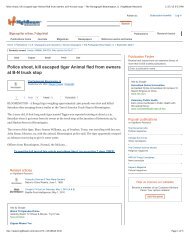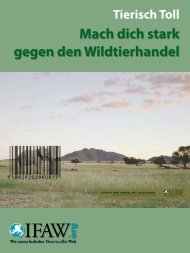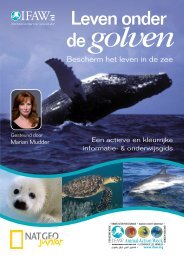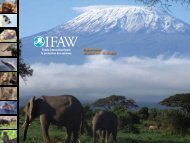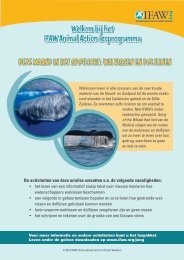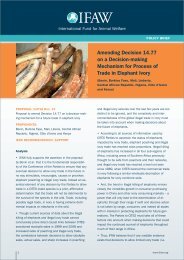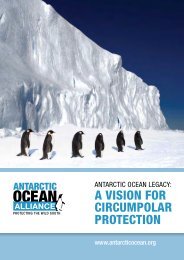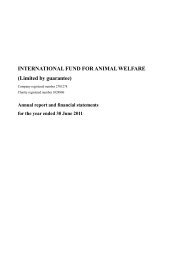leagal aspects of the whale watching.pdf - International Fund for ...
leagal aspects of the whale watching.pdf - International Fund for ...
leagal aspects of the whale watching.pdf - International Fund for ...
You also want an ePaper? Increase the reach of your titles
YUMPU automatically turns print PDFs into web optimized ePapers that Google loves.
4 OVERVIEW OF FACTORS AND IMPACTS ENGENDERING A NEED FOR<br />
PROTECTIVE MEASURES<br />
The history <strong>of</strong> IFAW’s ef<strong>for</strong>ts to organise a series <strong>of</strong> six workshops designed to cover all <strong>aspects</strong> <strong>of</strong> <strong>whale</strong> <strong>watching</strong><br />
was explained. A summary <strong>of</strong> <strong>the</strong> three completed workshops was presented, and <strong>the</strong>ir recommendations<br />
discussed. Detailed reports on <strong>the</strong>se workshops are available upon request from IFAW (see also Section 6.6). These<br />
are:<br />
• Workshop on <strong>the</strong> Scientific Aspects <strong>of</strong> Managing Whale Watching, Montecastello di Vibio, Italy,<br />
30 March to 4 April, 1995<br />
• Workshop on <strong>the</strong> Special Aspects <strong>of</strong> Watching Sperm Whales, Roseau, Commonwealth <strong>of</strong> Dominica, 8-11<br />
January, 1996<br />
• Workshop on <strong>the</strong> Educational Values <strong>of</strong> Whale Watching, Provincetown, Massachusetts, USA,<br />
8-11 May, 1997<br />
The Workshop on <strong>the</strong> Legal Aspects <strong>of</strong> Whale Watching is <strong>the</strong> fourth <strong>of</strong> <strong>the</strong> six meetings. The fifth workshop on<br />
"The Social and Economic Aspects <strong>of</strong> Whale Watching" was held in Kaikoura, New Zealand. The sixth will attempt to<br />
bring toge<strong>the</strong>r <strong>the</strong> results <strong>of</strong> all <strong>the</strong> first five workshops.<br />
In considering <strong>the</strong> legal <strong>aspects</strong> <strong>of</strong> <strong>whale</strong> <strong>watching</strong> we must consider <strong>the</strong> possibility <strong>of</strong> both short-term and longterm<br />
impacts on cetaceans caused by this activity. However, <strong>the</strong> Workshop on <strong>the</strong> Scientific Aspects <strong>of</strong> Managing<br />
Whale Watching concluded that although <strong>the</strong>re are observable short-term effects (behavioural changes, flight<br />
reactions, scars from propeller strikes, etc.) <strong>the</strong>re is, to date, nei<strong>the</strong>r conclusive scientific evidence <strong>of</strong> long-term<br />
impacts, nor <strong>of</strong> a linkage between short-term and long-term effects. None<strong>the</strong>less, it was <strong>the</strong> general view that a<br />
precautionary approach should be adopted in managing <strong>whale</strong> <strong>watching</strong> operations, and that continuous<br />
monitoring <strong>of</strong> <strong>the</strong> effects <strong>of</strong> <strong>whale</strong> <strong>watching</strong> on cetaceans was <strong>the</strong> key to understanding <strong>the</strong> risks and <strong>the</strong> measures<br />
that need to be taken.<br />
5 SPECIAL CONSIDERATIONS<br />
5.1 Sanctuaries and o<strong>the</strong>r protected marine areas<br />
The significance and value <strong>of</strong> special marine protected areas <strong>for</strong> <strong>the</strong> regulation <strong>of</strong> <strong>whale</strong> <strong>watching</strong> was discussed, in<br />
particular whe<strong>the</strong>r <strong>the</strong>y enhance <strong>the</strong> ability to adopt <strong>whale</strong> <strong>watching</strong> regulations. The implication <strong>of</strong> <strong>the</strong> use <strong>of</strong> <strong>the</strong><br />
term "sanctuary" was discussed. The origin <strong>of</strong> <strong>the</strong> term’s usage in relation to <strong>whale</strong>s was outlined in <strong>the</strong> context <strong>of</strong><br />
<strong>the</strong> various agreements concluded on whaling which preceded <strong>the</strong> <strong>International</strong> Convention on <strong>the</strong> Regulation <strong>of</strong><br />
Whaling 1946 (ICRW). This continued <strong>the</strong> provision in previous agreements on whaling (<strong>the</strong> 1938 Protocol to <strong>the</strong><br />
1937 <strong>International</strong> Agreement <strong>for</strong> <strong>the</strong> Regulation <strong>of</strong> Whaling), which first established a sanctuary in <strong>the</strong> Antarctic as<br />
a place where commercial whaling was prohibited. However, when <strong>the</strong> Indian Ocean Sanctuary was established by<br />
<strong>the</strong> <strong>International</strong> Whaling Commission (IWC) in 1979, one <strong>of</strong> its purposes was stated to be to provide a control area<br />
which would allow a comparison to be made with <strong>the</strong> status <strong>of</strong> <strong>whale</strong>s in o<strong>the</strong>r areas not protected from<br />
exploitation. Some workshop members preferred <strong>the</strong> use <strong>of</strong> <strong>the</strong> phrases "protected area" or "special marine<br />
protected area" in order to avoid association with religious or o<strong>the</strong>r connotations <strong>of</strong> <strong>the</strong> term "sanctuary." The<br />
participants were in<strong>for</strong>med that a member <strong>of</strong> <strong>the</strong> IWC’s Scientific Committee was preparing a report listing <strong>the</strong><br />
world’s special marine protected areas, which take a variety <strong>of</strong> legal <strong>for</strong>ms.<br />
8 Legal Aspects <strong>of</strong> Whale Watching





